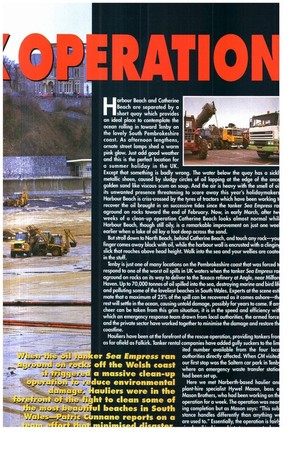H arbour Beach and Catherine Beach are separated by a short
Page 41

If you've noticed an error in this article please click here to report it so we can fix it.
quay which provides an ideal place to contemplate the ocean rolling in toward Tenby on the lovely South Pembrokeshire coast. As afternoon lengthens, ornate street lamps shed a warm pink glow. Just add good weather and this is the perfect location for a summer holiday in the UK. Except that something is badly wrong. The water below the quay has a sickl metallic sheen, caused by sludgy circles of oil lapping at the edge of the onc golden sand like viscous scum on soup. And the air is heavy with the smell of oi its unwanted presence threatening to scare away this year's holidaymaker Harbour Beach is criss-crossed by the tyres of tractors which have been working recover the oil brought in on successive tides since the tanker Sea Empress ra aground on rocks toward the end of February. Now, in early March, after tw weeks of a clean-up operation Catherine Beach looks almost normal whil Harbour Beach, though still oily, is a remarkable improvement on just one wee earlier when a lake of oil lay a foot deep across the sand.
But stroll down to North Beach, behind Catherine Beach, and touch any rock—yo finger comes away black with oil, while the harbour wall is encrusted with a clingin slick that reaches above head height. Walk into the sea and your wellies are coate in the stuff.
Tenby is just one of many locations on the Pembrokeshire coast that was forced respond to one of the worst oil spills in UK waters when the tanker Sea Empress ra aground on rocks on its way to deliver to the Texaco refinery at Angle, near Millar Haven. Up to 70,000 tonnes of oil spilled into the sea, destroying marine and bird lif and polluting some of the loveliest beaches in South Wales. Experts at the scene es mate that a maximum of 25% of the spill can be recovered as it comes ashore—th rest will setile in the ocean, causing untold damage, possibly for years to come. If an cheer can be taken from this grim situation, it is in the speed and efficiency wi which an emergency response team drawn from local authorities, the armed force and the private sector have worked together to minimise the damage and restore th coastline.
Hauliers have been at the forefront of the rescue operation, providing tankers fro as far afield as Falkirk. Tanker rental companies have added gully suckers to the Ii ited number available from the four loc authorities directly affected. When CM visite our first stop was the Saltern car park in Tenb where an emergency waste transfer statio had been set up.
Here we met Narberth-based haulier an plant-hire specialist Hywel Mason, boss Mason Brothers, who had been working on th operation for a week. The operation was nea ing completion but as Mason says: "This sub stance handles differently than anything w are used to." Essentially, the operation is fair
















































































































